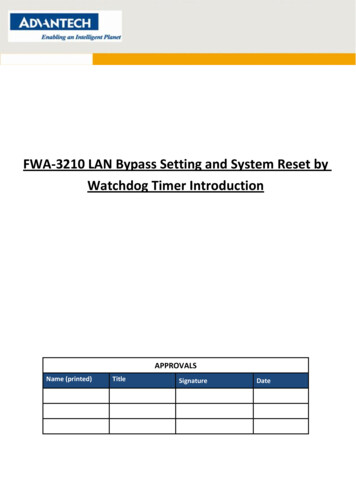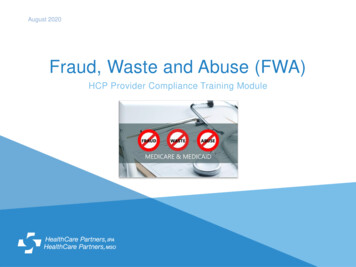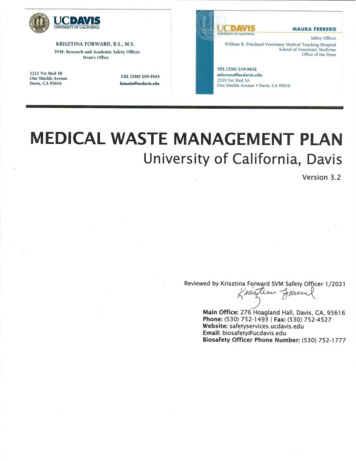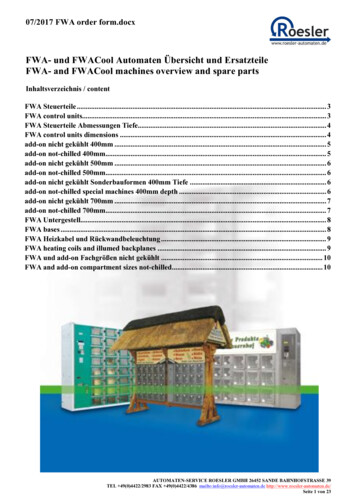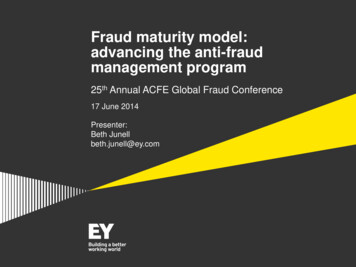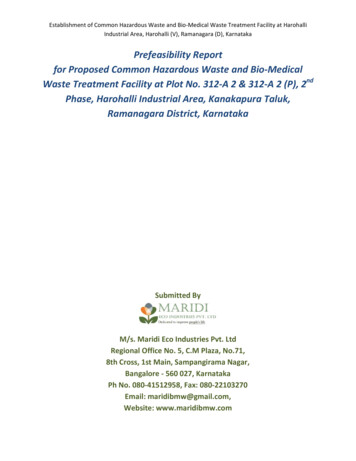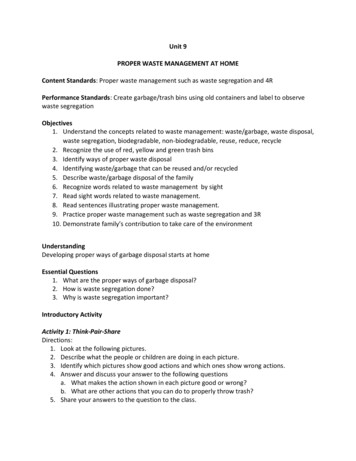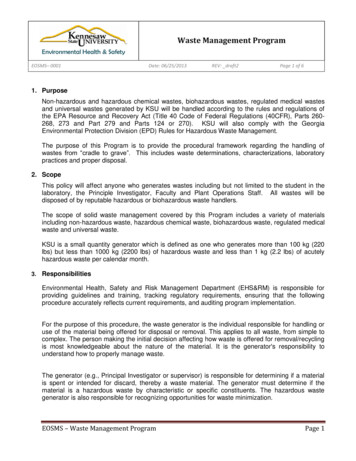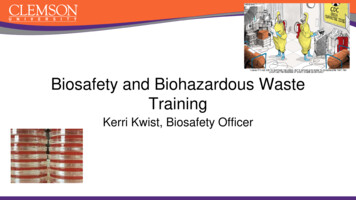
Transcription
Fraud, Waste and Abuse (FWA)Compliance TrainingHeritage Provider Network&Arizona Priority Care
Table of Contents1. Fraud, Waste, and Abuse Summary Fraud, Waste, and Abuse Definition and Examples Relevant Laws Possible Civil and Criminal Penalties/Administrative Sanctions Your Responsibilities Best Practices for Preventing FWA Discussing and Reporting Potential FWA Whistleblower Protections Remediation and Consequences of FWA Exclusion Lists Balance Billing
Table of Contents2. CMS Fraud, Waste, and Abuse Training Introduction Lesson 1 What is FWA? Difference Among Fraud, Waste, and Abuse Understanding FWA Civil False Claims Act (FCA) Health Care Fraud Statute Criminal Fraud Anti-Kickback Statute Stark Statute (Physician Self-Referral Law) Civil Monetary Penalties Law Exclusion Health Insurance Portability and Accountability Act (HIPAA) Lesson 1 Summary
Table of Contents2. CMS Fraud, Waste, and Abuse Training Lesson 2 Where Do I Fit In? What Are Your Responsibilities? How Do You Prevent FWA? Stay Informed About Policies and Procedures Report FWA Correction Indicators of Potential FWA Key Indicators Appendix A: Resources Appendix B: Job Aids
Fraud, Waste, and Abuse(FWA) SummaryCompliance TrainingHeritage Provider Network&Arizona Priority Care
Table of Contents Fraud, Waste, and Abuse Defined Examples of FWA Relevant Laws Administrative Sanctions, Possible Civil and Criminal Penalties Your Responsibilities Best Practices for Preventing and Discussing FWA Reporting Potential FWA Remediation and Consequences of FWA Exclusion List Balance BillingFWA & Balance Billing Training6
Fraud, Waste, and Abuse DefinedFraud: An intentional act of deception, misrepresentation, or concealment in orderto gain something of value. Occurs when an individual knows or should know that something is falseand makes a knowing deception that could result in some unauthorizedbenefit to him/herself or another person.Waste: Over-utilization of services (not caused by criminally negligent actions) andthe misuse of resources.Heritage Provider Network & Arizona Priority CareFWA & Balance Billing Training7
Fraud, Waste, and Abuse DefinedAbuse: Excessive or improper use of services or actions that is inconsistent withacceptable business or medical practice. Refers to incidents that, although not fraudulent, may directly or indirectlycause financial loss. Involves payment for items or services where there was no intent to deceiveor misrepresent, but the outcome results in unnecessary costs.Heritage Provider Network & Arizona Priority CareFWA & Balance Billing Training8
Examples of FWA Unnecessary procedures may cause injury or death. Diluted or substituted drugs may render treatment ineffective or expose thepatient to harmful side effects or drug interactions. Writing prescriptions for drugs that are not medically necessary, often inmass quantities, and often for individuals who are not patients of aprovider. Selecting or denying beneficiaries based on their illness profile or otherdiscriminating factors. Limiting access to needed services—for example, by not referring a patientto an appropriate provider.Heritage Provider Network & Arizona Priority CareFWA & Balance Billing Training9
Examples of FWA Theft of a prescriber’s Drug Enforcement Agency (DEA) number,prescription pad, or e-prescribing log-in information. Falsifying information in order to justify coverage. Falsely billed procedures create an erroneous record of the patient’smedical history. Billing for services not rendered or supplies not provided, including billingfor appointments the patient failed to keep. Double billing, such as billing both Medicare and the beneficiary, or billingMedicare and another insurer. Soliciting, offering, or receiving a kickback, bribe, or rebate (for example,paying for a referral of patients in exchange for the ordering of diagnostictests, and other services or medical equipment).Heritage Provider Network & Arizona Priority CareFWA & Balance Billing Training10
Relevant LawsThe False Claims Act (FCA): Prohibits knowingly presenting a false claim for payment or approval; ormaking or using a false record or statement in support of a false claim; Prohibits knowingly concealing or knowingly and improperly avoiding ordecreasing an obligation to pay the Government; and, Prohibits conspiring to violate the False Claims Act.The Anti-Kickback Statute: Makes it a criminal offense to knowingly and willfully offer, pay, solicit, orreceive any remuneration to induce or reward referrals of items or servicesreimbursable by a federal health care program. Remuneration includes anything of value, directly or indirectly, overtly orcovertly, in cash or in kind.Heritage Provider Network & Arizona Priority CareFWA & Balance Billing Training11
Relevant LawsThe Beneficiary Inducement Statute: Prohibits certain inducements to Medicare beneficiaries, e.g., waiving thecoinsurance and deductible amounts after determining in good faith that theindividual is in financial need.Self-Referral Prohibition Statute (Stark Law): Prohibits physicians from referring Medicare patients to an entity withwhich the physician or physician’s immediate family member has afinancial relationship—unless an exception applies.Red Flag Rule (Identity Theft Protection): Requires “creditors” to implement programs to identify, detect, and respondto patterns, practices, or specific activities that could indicate identity theft.Heritage Provider Network & Arizona Priority CareFWA & Balance Billing Training12
Possible Civil and Criminal PenaltiesFalse Claims Act For each false claim: 5,000 - 10,000 If the government proves it suffered a loss, the provider is liable for threetimes the loss.Anti-kickback Statute Up to five years in prison and fines of up to 25,000 If a patient suffers bodily injury as a result of a scheme, the prison sentencemay be 20 years.Heritage Provider Network & Arizona Priority CareFWA & Balance Billing Training13
Administrative Sanctions Denial or revocation of Medicare provider number application. Suspension of provider payments. Addition to the OIG List of Excluded Individuals/Entities (LEIE). License suspension or revocation.Heritage Provider Network & Arizona Priority CareFWA & Balance Billing Training14
Your ResponsibilitiesAs an employee or as a FDR of the company, you play a vital part in theprevention, detection, and in reporting any potential non-compliance and/orfraud, waste, and abuse. You are responsible in complying with all federal and state laws andregulations, company policies and procedures, and the companycompliance program. You are responsible for reporting any violations to the laws, regulations,policies and procedures, and to the company’s compliance program. You have a duty to follow the company’s Code of Conduct, whicharticulates the commitment to act with integrity and outlines other ethicalrules of behavior.Heritage Provider Network & Arizona Priority CareFWA & Balance Billing Training15
Best Practices for Preventing FWA Ensure you are familiar and up to date with laws, regulations, companypolicies and procedures, and the company’s compliance program. Monitor claims/billing for accuracy—ensure coding reflects servicesprovided. Monitor medical records—ensure documentation supports services rendered. Perform regular internal audits. Establish effective lines of communication with colleagues and staffmembers, verifying information provided to you. Ask about potential compliance issues in exit interviews. Be on the lookout for suspicious activity and take action if you identify aproblem.Heritage Provider Network & Arizona Priority CareFWA & Balance Billing Training16
Discussing Potential FraudDo Avoid any reference to potentially fraudulent claims activity Emphasize that a random review of the file is in process Prepare detailed documentation of all telephone callsDon’t Write on claims, bills, or other documentation Make any assumptions Mention that a claim is under investigation for fraud Make accusatory remarks to any callers.Heritage Provider Network & Arizona Priority CareFWA & Balance Billing Training17
Reporting Potential FWAEveryone has the right and responsibility to report possible fraud, waste, orabuse.Report issues or concerns to: Your organization’s compliance office or compliance hotline; HPN Corporate Compliance (methods available 24/7): Email: corporatecompliance@heritagemed.com Hotline: (855) 682-4127 1-800-MEDICARE.Remember:You may report anonymously and retaliation is prohibited when you report aconcern in good faith.Heritage Provider Network & Arizona Priority CareFWA & Balance Billing Training18
Whistleblower ProtectionsWhistleblower: An employee, former employee, or member of an organizationwho reports misconduct to people or entities that have the power to takecorrective action.A provision in the False Claims Act allows individuals to:– Report fraud anonymously– Sue an organization on behalf of the government and collect a portionof any settlement that resultsEmployers cannot threaten or retaliate against whistleblowers.Heritage Provider Network & Arizona Priority CareFWA & Balance Billing Training19
Remediation of Detected FWAOnce fraud, waste, and abuse has been detected it must be promptly correctedto prevent further continuance, to prevent unnecessary costs, and to ensurecompliance with federal and state laws and regulations.Remediation of Detected FWA: An investigation and review of suspected non-compliance or FWA will beconducted. If through the investigation the violation is proved to have occurred, acorrective action will be immediately initiated, which may include:– Making any applicable restitutions;– Implementing system changes to ensure that similar violations do notoccur in future; and,– Reporting any violations to the appropriate persons/institutions.Heritage Provider Network & Arizona Priority CareFWA & Balance Billing Training20
Consequences of Committing FWAThe following are potential penalties for anyone who commits fraud, waste, orabuse and may vary depending on the violation: Termination of employment or contractCivil Money PenaltiesCriminal Conviction/FinesCivil ProsecutionImprisonmentLoss of Provider License, if applicableExclusion from Federal Health Care programsHeritage Provider Network & Arizona Priority CareFWA & Balance Billing Training21
Exclusion Lists We do not employ or contract with individuals listed on the exclusion listsmaintained by the Office of Inspector General (OIG/LEIE) or System forAward Management (SAM). This is part of the new hire and credentialing process and is conducted priorto hire/contracting and monitored on a monthly basis.Heritage Provider Network & Arizona Priority CareFWA & Balance Billing Training22
Balance Billing Balance billing occurs when a provider or hospital charges the patient forMedicare covered services. Federal and State laws prohibit billing members for covered services that arenot the responsibility of the member, which could include co-pays, coinsurance, deductibles or administrative fees. Providers who engage in balance billing may be subject to sanctions by theHealth Plans, CMS and other industry regulators.Providers cannot balance bill a Medicareeligible beneficiary for any covered benefit.Heritage Provider Network & Arizona Priority CareFWA & Balance Billing Training23
Balance Billing Examples When a provider bills a CMC patient to compensate for the difference theyare allowed to charge. For example, if the provider charges 100 for aservice, but the insurance only allows a charge of 70, the provider may notbill the patient for the remaining 30. Provider offices charging administrative fees for appointments, completingforms, or referrals. Non-contracted or fee-for-service providers charging members who areenrolled in managed care for any part of a covered service.Heritage Provider Network & Arizona Priority CareFWA & Balance Billing Training24
Approved Billing Practices Providers may bill patients who have a monthly share of cost obligation butonly until that obligation is met for the month. Providers may bill for all services that are NOT covered by the patient’smanaged care plan. Providers may bill for co-payments or co-insurance fees required by thepatient’s health insurance.Heritage Provider Network & Arizona Priority CareFWA & Balance Billing Training25
Best Practices for Preventing Balance Billing Verify the patient’s eligibility and coverage of benefits at every visit – don’trely solely on the information presented by the patient (i.e. health insurancecard, benefit summary, etc.)– Providers may verify eligibility by utilizing the AHCCCS eligibilitywebsite at https://azweb.statemedicaid.us/Account/Login or by calling(602) 417-7200. Understand patient rights pertaining to billing protections. Take appropriate action if balance billing occurs. Tell the member not topay the bill and reverse any charges as necessary.Heritage Provider Network & Arizona Priority CareFWA & Balance Billing Training26
CMS Fraud, Waste, andAbuse (FWA) TrainingHeritage Provider Network&Arizona Priority Care
IntroductionAnyone who conducts business with Heritage Provider Network andArizona Priority Care, including employees, FDRs, vendors, and otherentities, are required to participate in the CMS Fraud, Waste, and Abusetraining, as mandated by CFR §§ 422.503(b)(4)(vi)(C)(3) and423.504(b)(4)(vi)(C)(4)).The Medicare Parts C and D General Compliance Training course isbrought to you by the Medicare Learning Network , a registeredtrademark of the U.S. Department of Health & Human Services (HHS)Centers for Medicare and Medicaid ServicesCombating FWA Training28
IntroductionThis Web-Based Training (WBT) course was current at the time it waspublished or uploaded onto the web. Medicare policy changes frequently solinks to the source documents have been provided within the WBT for yourreference.This WBT course was prepared as a service to the public and is not intended togrant rights or impose obligations. This WBT may contain references or links tostatutes, regulations, or other policy materials. The information provided is onlyintended to be a general summary. It is not intended to take the place of eitherthe written law or regulations. We encourage readers to review the specificstatutes, regulations, and other interpretive materials for a full and accuratestatement of their contents.Note: The referenced Web-Based Training (WBT) is available on the CMS website.Centers for Medicare and Medicaid ServicesCombating FWA Training29
IntroductionThis training module will assist Medicare Parts C and D plan Sponsorsemployees, governing body members, and their first-tier, downstream, andrelated entities (FDRs) in satisfying the annual Fraud, Waste, and Abuse (FWA)training requirements in the regulations and sub-regulatory guidance at: 42 Code of Federal Regulations (CFR) Section 422.503(b)(4)(vi)(C); 42 CFR Section 423.504(b)(4)(vi)(C); CMS-4159-F, Medicare Program Contract Year 2017 Policy and TechnicalChanges in the Medicare Advantage and the Medicare Prescription DrugBenefit Programs; and Section 50.3.2 of the Compliance Program Guidelines (Chapter 9 of the“Medicare Prescription Drug Benefit Manual” and Chapter 21 of the“Medicare Managed Care Manual”).Centers for Medicare and Medicaid ServicesCombating FWA Training30
IntroductionSponsors and their FDRs may use this module to satisfy FWA trainingrequirements. Sponsors and their FDRs are responsible for providing additionalspecialized or refresher training on issues posing FWA risks based on theemployee’s job function or business setting.AcronymTitle TextCFRCode of Federal RegulationsFDRFirst-tier, Downstream, and Related EntityFWAFraud, Waste, and AbuseWBTWeb-Based TrainingCenters for Medicare and Medicaid ServicesCombating FWA Training31
IntroductionWelcome to the Medicare Learning Network (MLN) - Your free Medicare educationand information resource! The MLN is home for education, information, and resourcesfor the health care professional community. The MLN provides access to the CMSProgram information you need, when you need it, so you can focus more on providingcare to your patients. Serving as the umbrella for a variety of CMS education andcommunication activities, the MLN offers:1. MLN Educational Products, including MLN Matters Articles;2. Web-Based Training (WBT) Courses (many offer Continuing Education credits);3. MLN Connects National Provider Calls;4. MLN Connects Provider Association Partnerships;5. MLN Connects Provider eNews; and6. Provider electronic mailing lists.The Medicare Learning Network , MLN Connects , and MLN Matters areregistered trademarks of the U.S. Department of Health & Human Services (HHS).Note: The referenced Medicare Learning Network (MLN) is available on the CMS website and offers variouscourses including Fraud, Waste, and Abuse.Centers for Medicare and Medicaid ServicesCombating FWA Training32
IntroductionACRONYMTITLE TEXTCMSCenters for Medicare & Medicaid ServicesMLNMedicare Learning Network HYPERLINK URLLINKED on/Medicare-Learning-NetworkMLN/MLNProductsMLN Educational N Matters Articleshttps://learner.mlnlms.comWBT Outreach/NPCMLN Connects National Provider dicare-Learning-NetworkMLN/MLN-PartnershipMLN Connects Provider h-and-Education/Outreach/FFSProvPartProgMLN Connects Provider eNewsHYPERLINK URL/JAVASCRIPTLINKED TEXT tions-Items/CMS1243324.htmlProvider Electronic Mailing ListsCenters for Medicare and Medicaid ServicesCombating FWA Training33
IntroductionWhy Do I Need Training? Every year billions of dollars are improperly spent because of Fraud,Waste, and Abuse (FWA). It affects everyone – including you. Thistraining helps you detect, correct, and prevent FWA. You are part ofthe solution. Combating FWA is everyone’s responsibility. As an individual whoprovides health or administrative services for Medicare enrollees,every action you take potentially affects Medicare enrollees, theMedicare Program, or the Medicare Trust Fund.Centers for Medicare and Medicaid ServicesCombating FWA Training34
IntroductionTraining Requirements: Plan Employees, Governing Body Members, andFirst-Tier, Downstream, or Related Entity (FDR) Employees Certain training requirements apply to people involved in Medicare Parts Cand D. All employees of Medicare Advantage Organizations (MAOs) andPrescription Drug Plans (PDPs) (collectively referred to in this course as"Sponsors") must receive training for preventing, detecting, and correctingFWA. FWA training must occur within 90 days of initial hire and at least annuallythereafter.Centers for Medicare and Medicaid ServicesCombating FWA Training35
IntroductionLearn more about Medicare Part CMedicare Part C, or Medicare Advantage (MA), is a health plan choice available to Medicare beneficiaries. MA isa program run by Medicare-approved private insurance companies. These companies arrange for, or directlyprovide, health care services to the beneficiaries who elect to enroll in an MA plan.MA plans must cover all services that Medicare covers with the exception of hospice care. MA plans providePart A and Part B benefits and may also include prescription drug coverage and other supplemental benefits.Learn more about Medicare Part DMedicare Part D, the Prescription Drug Benefit, provides prescription drug coverage to all beneficiaries enrolledin Part A and/or Part B who elect to enroll in a Medicare Prescription Drug Plan (PDP) or an MA PrescriptionDrug (MA-PD) plan. Insurance companies or other companies approved by Medicare provide prescription drugcoverage to individuals who live in a plan's service area.Centers for Medicare and Medicaid ServicesAcronymTitle TextMAMedicare AdvantageCombating FWA Training36
IntroductionFWA Training Requirements ExceptionThere is one exception to the FWA training and education requirement. FDRswill have met the FWA training and education requirements if they have metthe FWA certification requirement through: Accreditation as a supplier of Durable Medical Equipment, Prosthetics,Orthotics, and Supplies; or Enrollment in Medicare Part A (hospital) or B (medical) Program.If you are unsure if this exception applies to you, please contact yourmanagement team for more information. TITLECenters for Medicare and Medicaid ServicesCombating FWA Training37
IntroductionCourse ContentThis WBT course consists of two lessons:1.2.What Is FWA?Your Role in the Fight Against FWAAnyone who provides health or administrative services to Medicareenrollees must satisfy general compliance and FWA trainingrequirements. You may use this WBT course to satisfythe FWA requirements.You do not have to complete the course in one session; however, youmust complete at least the Introduction before exiting the course. Donot click the "X" button in the upper right-hand cornerof the window as this will cause you to exit the WBT course withoutproperly saving your progress. It should take approximately 20minutes to complete this course.Successfully completing the course requires completing the entirelesson and course evaluation, and scoring 70 percent or higher onthe Post-Assessment. After successfully completing thePost-Assessment, you'll get instructions to complete the courseevaluation and print your certificate.Centers for Medicare and Medicaid ServicesCourse CuesThis course uses cues at varioustimes to provide additionalinformation. The cues arehyperlinks, buttons, acronyms,pop-up windows, and printingcues. For more information oncourse cues, click the "HELP"button in the upper right corner.Screen ResolutionIf you need to adjust your screenresolution, access instructionsthrough the "HELP" button inthe upper right corner and go tothe "Screen Resolution” section.Note: Instructions applieswhen taking Web-BasedTraining on MedicareLearning Network site.Combating FWA Training38
IntroductionCourse ObjectivesWhen you complete this course, you should be able to correctly: Recognize FWA in the Medicare Program;Identify the major laws and regulations pertaining to FWA;Recognize potential consequences and penalties associated with violations;Identify methods of preventing FWA;Identify how to report FWA; andRecognize how to correct FWA.TITLECenters for Medicare and Medicaid ServicesCombating FWA Training39
Lesson 1: What is FWA?This lesson describes Fraud, Waste, and Abuse (FWA) and the laws thatprohibit it. It should take about 10 minutes to complete. Upon completing thelesson, you should be able to correctly: Recognize FWA in the Medicare Program; Identify the major laws and regulations pertaining to FWA; and Recognize potential consequences and penalties associated with violations.TITLECenters for Medicare and Medicaid ServicesAcronymTitle TextFWAFraud, Waste, and AbuseCombating FWA Training40
Lesson 1: What is FWA?Fraud is knowingly and willfully executing, or attemptingto execute, a scheme or artifice to defraud any health carebenefit program, or to obtain, by means of false orfraudulent pretenses, representations, or promises, any ofthe money or property owned by, or under the custody orcontrol of, any health care benefit program.The Health Care Fraud Statute makes it a criminal offenseto knowingly and willfully execute a scheme to defraud ahealth care benefit program. Health care fraud is punishableby imprisonment for up to 10 years. It is also subject tocriminal fines of up to 250,000Centers for Medicare and Medicaid ServicesIn other words,fraud is intentionallysubmittingfalse information tothe Government or aGovernmentcontractor to getmoney or a benefit.Combating FWA Training41
Lesson 1: What is FWA?Waste includes overusing services, or other practices that,directly or indirectly, result in unnecessary costs to theMedicare Program. Waste is generally not considered to becaused by criminally negligent actions but rather by themisuse of resources.Abuse includes actions that may, directly or indirectly,result in unnecessary costs to the Medicare Program. Abuseinvolves payment for items or services when there is notlegal entitlement to that payment and the provider has notknowingly and/or intentionally misrepresented facts toobtain payment.For the definitions offraud, waste, and abuse,refer to Chapter 21,Section 20 of the“Medicare Managed CareManual” and Chapter 9 ofthe “Prescription DrugBenefit Manual” on theCenters or Medicare &Medicaid Services (CMS)website.HYPERLINK URLLINKED nce/Guidance/Manuals/Downloads/mc86c21.pdfMedicare Managed Care pter9.pdfPrescription Drug Benefit ManualCenters for Medicare and Medicaid ServicesCombating FWA Training42
Lesson 1: What is FWA?Examples of actions that may constitute Medicare fraud include: Knowingly billing for services not furnished or supplies not provided,including billing Medicare for appointments that the patient failed to keep; Billing for non-existent prescriptions; and Knowingly altering claim forms, medical records, or receipts to receive ahigher payment.Examples of actions that may constitute Medicare waste include: Conducting excessive office visits or writing excessive prescriptions; Prescribing more medications than necessary for the treatment of a specificcondition; and Ordering excessive laboratory tests.Centers for Medicare and Medicaid ServicesCombating FWA Training43
Lesson 1: What is FWA?Examples of actions that may constitute Medicare abuse include: Billing for unnecessary medical services; Billing for brand name drugs when generics are dispensed; Charging excessively for services or supplies; and Misusing codes on a claim, such as upcoding or unbundling codes.Centers for Medicare and Medicaid ServicesCombating FWA Training44
Difference Among Fraud, Waste, and AbuseThere are differences among fraud, waste, and abuse. One of the primarydifferences is intent and knowledge. Fraud requires intent to obtain payment and the knowledge that the actionsare wrong. Waste and abuse may involve obtaining an improper payment or creatingan unnecessary cost to the Medicare Program, but does not require thesame intent and knowledge.Centers for Medicare and Medicaid ServicesCombating FWA Training45
Lesson 1: Understanding FWATo detect FWA, you need to know the law.The following screens provide high-level information about the followinglaws: Civil False Claims Act, Health Care Fraud Statute, and Criminal Fraud;Anti-Kickback Statute;Stark Statute (Physician Self-Referral Law);Exclusion; andHealth Insurance Portability and Accountability Act (HIPAA).For details about the specific laws, such as safe harbor provisions, consult theapplicable statute and regulations.Centers for Medicare and Medicaid ServicesCombating FWA Training46
Lesson 1: Civil False Claims Act (FCA)The civil provisions of the FCA make a person liable to pay damages to the Governmentif he or she knowingly: Conspires to violate the FCA;. Carries out other acts to obtain property from the Government bymisrepresentation; Knowingly conceals or knowingly and improperly avoids or decreases anobligation to pay the Government; Makes or uses a false record or statement supporting a false claim; or Presents a false claim for payment or approvalFor more information, refer to 31 United States Code (U.S.C.) Sections 3729-3733 onthe Internet.Damages and PenaltiesAny person who knowingly submits false claims to the Government is liable for three times theGovernment’s damages caused by the violator plus a penalty. The Civil Monetary Penalty(CMP) may range from 5,500 to 11,000 for each false claim.Centers for Medicare and Medicaid ServicesCombating FWA Training47
Lesson 1: Civil False Claims Act (FCA)EXAMPLEA Medicare Part C plan in Florida: Hired an outside company to review medical records to find additionaldiagnosis codes that could be submitted to increase risk capitation paymentsfrom the Centers for Medicare & Medicaid Services (CMS); Was informed by the outside company that certain diagnosis codes previouslysubmitted to Medicare were undocumented or unsupported; Failed to report the unsupported diagnosis codes to Medicare; and Agreed to pay 22.6 million to settle FCA allegations.ACRONYMTITLE TEXTFCAFalse Claims ActHYPERLINK URLLINKED -subchapIII.pdf31 United States Code (U.S.C.) Sections 37293733Centers for Medicare and Medicaid ServicesCombating FWA Training48
Lesson 1: Civil False Claims Act (FCA)WhistleblowersA whistleblower is a person who exposes information or activity that isdeemed illegal, dishonest, or violates professional or clinical standards.Protected: Persons who report false claims or bring legal actions to recovermoney paid on false claims are protected from retaliation.Rewarded: Persons who bring a successful whistleblower lawsuit receive atleast 15 percent but not more than 30 percent of the money collected.Centers for Medicare and Medicaid ServicesCombating FWA Training49
Lesson 1: Health Care Fraud StatuteThe Health Care Fraud Statute states that “Whoever knowingly and willfully executes, or attemptsto execute, a scheme to defraud any health care benefit program shall be fined or
An investigation and review of suspected non- compliance or FWA will be conducted. If through the investigation the violation is proved to have occurred, a corrective action will be immediately initiated, which may include: - Making any applicable restitutions; - Implementing system changes to ensure that similar violations do not
